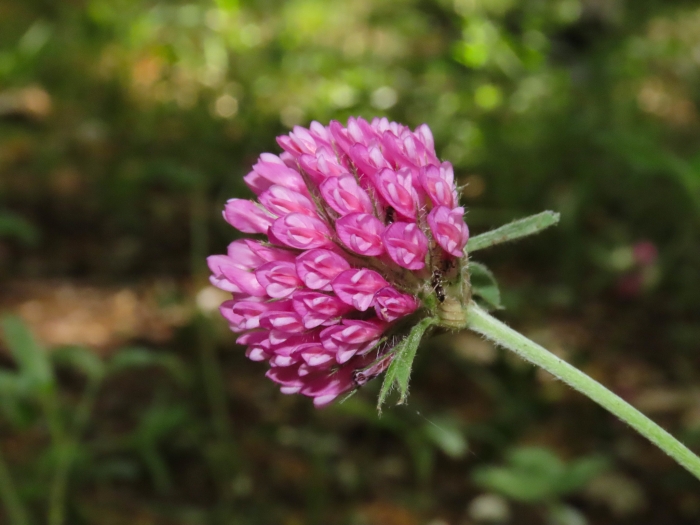Owl-Head Clover
(Trifolium alpestre)
Owl-Head Clover (Trifolium alpestre)
/
/

Emanuele Santarelli
CC BY-SA 4.0
Image By:
Emanuele Santarelli
Recorded By:
Copyright:
CC BY-SA 4.0
Copyright Notice:
Photo by: Emanuele Santarelli | License Type: CC BY-SA 4.0 | License URL: http://creativecommons.org/licenses/by-sa/4.0/ | Rights Holder: Emanuele Santarelli | Publisher: iNaturalist | Date Created: 2019-06-16T15:22:44-07:00 |

























Estimated Native Range
Summary
Trifolium alpestre, commonly known as owl-head clover or purple-globe clover, is a perennial herb native to a range of habitats including alpine meadows, grasslands, and open woodlands in central, southern, and eastern Europe, the Caucasus, Turkey, and Iran. It typically grows to a height of 10-60 cm and features trifoliate leaves and spherical, dense flower heads that are a striking purple color, blooming from late spring to early summer. The flowers are highly attractive to bees and other pollinators.
Owl-head clover is valued for its ornamental qualities, including its unique flower shape and color, and its ability to attract beneficial insects to the garden. It is used in wildflower meadows, as part of pollinator-friendly plantings, and in naturalistic garden settings. This clover prefers full sun to partial shade and thrives in well-drained soils, tolerating a range of soil types. While it is not a high-maintenance plant, it benefits from occasional watering during prolonged dry periods. It is not commonly associated with serious pests or diseases, but can be susceptible to root rot in poorly drained soils. Owl-head clover can be propagated by seed, and its clonal growth habit allows it to form dense patches, which can be beneficial for erosion control but may also lead to it becoming somewhat invasive in certain conditions outside its native range.CC BY-SA 4.0
Owl-head clover is valued for its ornamental qualities, including its unique flower shape and color, and its ability to attract beneficial insects to the garden. It is used in wildflower meadows, as part of pollinator-friendly plantings, and in naturalistic garden settings. This clover prefers full sun to partial shade and thrives in well-drained soils, tolerating a range of soil types. While it is not a high-maintenance plant, it benefits from occasional watering during prolonged dry periods. It is not commonly associated with serious pests or diseases, but can be susceptible to root rot in poorly drained soils. Owl-head clover can be propagated by seed, and its clonal growth habit allows it to form dense patches, which can be beneficial for erosion control but may also lead to it becoming somewhat invasive in certain conditions outside its native range.CC BY-SA 4.0
Plant Description
- Plant Type: Herb
- Height: 0.5-1.5 feet
- Width: 0.5-1 feet
- Growth Rate: Moderate
- Flower Color: Pink, White
- Flowering Season: Spring, Summer
- Leaf Retention: Deciduous
Growth Requirements
- Sun: Full Sun, Part Shade
- Water: Medium
- Drainage: Medium
Common Uses
Bee Garden, Low Maintenance
Natural Habitat
Alpine meadows, grasslands, and open woodlands
Other Names
Common Names: Alpine Clover, Alpen-Klee, Purple-Globe Clover, Oval-Head Clover
Scientific Names: , Trifolium alpestre, Trifolium alpestre f. bicefala, Trifolium alpestre f. heterofoliolata, Trifolium alpestre f. lanigerum, Trifolium alpestre f. monostachyum, Trifolium alpestre subsp. lanigerum, Trifolium alpestre var. alpestre, Trifolium alpestre var. davidovii, Trifolium alpestre var. distachyum
GBIF Accepted Name: